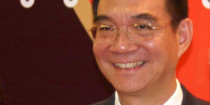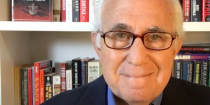Watch the February 4 Schiller Institute conference
Ray McGovern: Thank you, Dennis. I’m very happy to be with you. The title of my little talk here, “Know Where You Stand, and Stand There,” comes from a commencement address by my friend and tutor and mentor, Father Dan Berrigan. Actually, it doesn’t come from that commencement address, it is the sum and total of that commencement address. He was asked by a very prestigious university to come and give the commencement address; this was about four decades ago. He came, and he stood up there, and he said those words—“Know where you stand, and stand there.” And then he very politely left and sat down with the audience. That’s all you really need to know, folks. You need to know where you stand, and stand there.
Now, sometimes we’re a little worried. Nonviolence is good, but sometimes when we put ourselves in other people’s faces and they react with a very great anger, we too are tempted to get angry. Not only at their reaction, but at the whole concept of the widespread injustice throughout the world. So, I would just encourage us all to remember that anger is a virtue. None other than Thomas Aquinas said so. He said, “Anger is a virtue, but you have to have just so much of it.” He warned against too much anger—iracundia—always being ticked off, that was the Latin word. But he also warned about “unreasoned patience”—that’s the best we could do from the Latin. He said “Unreasoned patience sows the seeds of vice, nourishes negligence, and encourages good people to tolerate bad people, or the bad things that people do. I don’t really think there are bad people.”
So, what we need to do here is figure out how to act; how to act nonviolently and with just the right dosage of the virtue of anger. I’m not the greatest representative of what is now called by José Vega and others “interventions.” Interventions in the same sense of the word, people are pretty crazy in Washington. But I’ll give you some personal examples of how I tried to stand up and do what Dan Berrigan suggested.
First slide, please. This is a photo of me standing up, turning my back to Hillary Clinton, who you can see off my left shoulder. She was talking about repression in Iran, and suffice it to say, there was great repression exercised on me simply for standing up, not saying a word, nonviolently again but angry. I was beat up pretty badly, but I didn’t even have to stay in jail that night. I got to go home. I had to go to the hospital first, and interestingly enough, the doctor said, “Now, you were beaten up. You have to report this to the authorities.” I said, “To State Department security? They did it!”
Second slide, please. Here I wasn’t so lucky; I did have to spend the night in jail. But that’s OK; good things happen in jail. You get to feel what other people feel being all closed up and unfree. What are the lessons here? Well, this particular photo was taken after I stood up and intervened, so to speak, with the Senate Intelligence Committee before they approved the nomination of torturer-in-chief Gina Haspel to be the new CIA director five or six years ago. What encouraged me to do that? Just the obscenity of the whole thing. Hello! So, what do you do in situations like that? Well, number one, you kind of, as you can see, you blend in with the indigenous to get in. You put your best wedding suit on, which I had. Number two, you stay away from known interveners—Code Pink, for example. You let them sit over in a corner; you go separately. Number three, you hope that one of those Code Pinkers has a camera—and indeed, one did. Therefore, this picture, after they had taken me out of the hearing room. And what I have as number four here, I was just thinking today. People have been asking me, “What’s this green band you have on there, Ray?” Let me read it to you. “Rachel Corrie, April 10, 1979 – March 16, 2003.” Suffice it to say that if 23-year old Rachel Corrie can stand up to Israeli bulldozers about to demolish yet another Palestinian home, and then, that Israeli bulldozer being instructed to back up over Rachel to make sure that her back was broken. Three days before the attack on Iraq, so it would not make the headlines. Well, if Rachel Corrie can do that, McGovern, you can do that, too. At least you’re not going to get run over, yet at least, by an Israeli bulldozer.
We Catholics call this a sacramental; something that reminds you of a grace-giving event, or a grace-giving thing, or a grace-giving person like Rachel Corrie. Her dad gave me this bracelet three months after she was killed.
I want to also suggest that those of you who are interested in some action, go to all the think tank presentations as José Vega has started to do. Here’s one that I’d like to show you. There’s a little clip of an event at John Podesta’s and Hillary Clinton’s old think tank. I went to all those things as long as I lived in Washington. Sometimes I got to ask questions, if they were never welcome. This time, they didn’t recognize me, they didn’t let me ask a question. But I hung around; you might say “Nevertheless, I persisted.” So, I went up to Adam Schiff, then-head of the House Intelligence Committee, and asked him about Russian hacking, which now has been conclusively disproven. Could we show this two-minute clip? If you fall asleep, you’ll miss the whole thing.
MCGOVERN: My name is Ray McGovern. I served in CIA under seven Presidents and nine directors.
ADAM SCHIFF: Thank you very much.
MCGOVERN: We have a little alumni group called Veteran Intelligence Professionals for Sanity. We’ve been following this issue very closely. One of our members is the former technical director of NSA. I’m interested in, one week ago, when the President said this—I don’t want to misquote him—“The conclusions of the Intelligence Committee with respect to Russian hacking were not conclusive regarding WikiLeaks.” In other words, there’s a big gap between alleged Russian hacking and WikiLeaks. The Intelligence Committee does not know how or if that information—to the degree it exists—got to WikiLeaks. Now, you assert as flat fact that Russia did this. Do you know more than Obama?
SCHIFF: Well, I would never claim to know more than Obama. I think he’s a brilliant man.
MCGOVERN: That’s a very serious question.
SCHIFF: It’s a serious question. I have every confidence in the intelligence of Russian hacking of both the DNC as well as John Podesta.
MCGOVERN: James Clapper is a convicted—
SCHIFF: Do you want to hear the answer? I will, and while I can’t go into the classified information, I have every confidence that the Russians have used WikiLeaks. Whether Julian Assange was a known participant, or as the Russians describe a useful idiot, that we will hopefully find out. But, I don’t have any question in the conclusions of the Intelligence Committee.
MCGOVERN: You have every confidence, but no evidence, is that right?
SCHIFF: No, I can’t share the evidence with you.
MCGOVERN: That’s bogus. [end video]
MCGOVERN [live]: Well, I have to concede now after all these years, that Schiff said one thing that was true. That was that he couldn’t share that information with me, because it didn’t exist.
What’s the lesson here? I just want to encourage everyone—go; go to these meetings; go to these think tanks, and nevertheless persist. I didn’t know the camera was still on. I didn’t know that C-Span still had audio. But I did it, and I’m glad because that was captured.
Now, what else? I’m going to read in conclusion, a poem written by my mentor, Dan Berrigan, a quote from whom we started this little talk. It’s called, “Some.” I don’t want to spoil it for you; it’s not very long, but I do want to have a photo up as backdrop. Could we have that slide #4 please.
SOME
Some stood up once and sat down.
Some walked a mile and walked away.
Some stood up twice and sat down
I’ve had it, they said.
Some walked two miles and walked away
It’s too much, they cried.
Some stood and stood and stood.
They were taken for dummies
They were taken for fools
They were taken for being taken in.
Some walked and walked and walked.
They walked the earth
They walked the waters
They walked the air.
Why do you stand?
they were asked, and
Why do you walk?
Because of the children, they said, and
Because of the heart, and
Because of the bread.
Because
the cause
is the heart’s beat
and the children born
and the risen bread.
[photo] You’re looking at a little boy, two years old, the age of our youngest of ten grandchildren. He was trying to escape the oppression, the war in Syria. He was of Kurdish origin, the stepchildren of all wars. And suffice it to say, he drowned with his big brother and his mother, trying to get to Greece. Alan Kurdi is his name. “Because of the children,” they said. So, nevertheless, we must persist, because of the children. And we must look for moral leadership; but absent moral leadership, we’re it. There’s no other but us. We can appeal—for example, I have appealed to Pope Francis, and that’s appeared on the largest religious network run by Catholics. You can see it on my website—raymcgovern.com. But we can’t wait; we can’t wait for a voice from the Vatican. We have to do what we can ourselves. That’s why I applaud and I welcome the chance to be on every Schiller conference to which I am invited. I applaud all of us, and particularly Helga, for exercising moral leadership at this critical point in time. Thanks very much for your attention.











